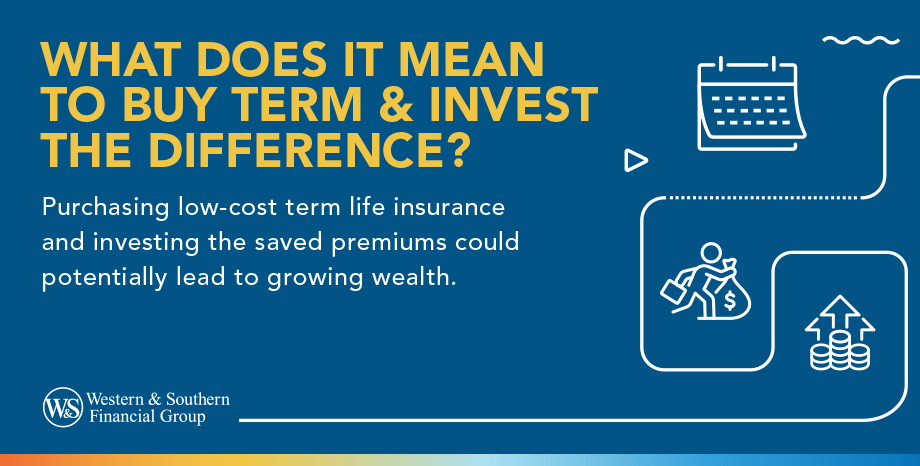

Table of Contents
Key Takeaways
- Buy term and invest the difference" means purchasing affordable term life insurance and investing the money you save compared to more expensive whole life insurance.
- Term life insurance provides cost-effective coverage for a specific period, and the premium savings can be used for investments.
- Investing in the difference between term and whole-life premiums can help achieve higher returns and greater financial security over time.
- This strategy emphasizes financial discipline, as consistently investing in savings is crucial for building wealth.
- Consulting a financial advisor ensures that your "buy term and invest the difference" strategy is tailored to your financial situation and goals.
What Is Term Life Insurance?
Term life insurance is a straightforward and affordable type of life insurance that provides coverage for a specific period or "term." This term usually ranges from 10 to 30 years. If the insured person dies during this period, their beneficiaries receive a death benefit, a lump sum paid out by the insurance company. However, if the policyholder outlives the term, the coverage ends, and there is no payout.
When considering life insurance coverage options, term life insurance has numerous practical benefits:
- Simplicity and Affordability: Term life insurance is often preferred for its simplicity and lower cost. Its affordable premiums are due to its limited coverage term and lack of a cash value component.
- Fixed Premiums: Premiums are fixed during the policy term, making them stable regardless of age or health changes, simplifying budgeting.
- Flexible Term Lengths: Choose a term length of 10, 15, 20, or 30 years to align your coverage with financial responsibilities like paying off a mortgage, funding education, or covering income during your working years.
- High Coverage Amounts: Term life insurance is more affordable, allowing individuals to buy higher coverage to ensure their family can maintain their standard of living, cover debts, and manage daily expenses if they die.
- Conversion Options: Many term life insurance policies allow conversion to permanent life insurance later without a new medical exam, which is beneficial if your health has declined.
- Financial Protection for Dependents: Term life insurance primarily provides financial protection for your loved ones, covering essential expenses like mortgage payments, education, and daily living expenses in the event of your unexpected death.
The Concept of "Invest the Difference"
"Buy term and invest the difference" is a simple idea. Instead of buying a more expensive whole life insurance policy, you buy a term one. Term life insurance is cheaper because it only covers a specific period, like 10, 20, or 30 years. The money you save from choosing a less expensive term policy is then invested.
For example, let's say you have $100 monthly on life insurance. A whole life policy might cost $80 per month, leaving you with just $20. However, a term policy might only cost $20 monthly, leaving you with $80 to invest. The idea is that the investments will grow over time, potentially giving you more financial security than a whole life policy alone.
Types of Investments and Their Potential Returns
You can invest the money you save in several ways by choosing term life insurance, with returns varying widely based on the type of assets you choose and market conditions. Here’s a general idea of what you might expect:
Stocks
Buying shares in individual companies may offer high returns, but they also come with higher risk. Stocks are best for long-term growth and are suitable if you have a higher risk tolerance. The stock market historically returns 6-10% annually after inflation, though this can fluctuate significantly from year to year.1
Bonds
Bonds, loans to companies or governments, pay interest over time and are typically safer than stocks but offer lower returns. They provide steady income and help balance portfolio risk. Returns typically range from 4-5% per year, depending on the type of bond.2 Government bonds are safer but offer lower returns, while corporate bonds offer higher returns with more risk.
Mutual Funds & Exchange-Traded Funds (ETFs)
Mutual funds pool money from many investors to buy a diversified portfolio of stocks, bonds, or other assets, offering a good balance of risk and return.3 ETFs also provide diversification but trade-like individual stocks and often have lower fees, making them a flexible investment option.
These can vary, but a well-diversified mutual fund or ETF might have returns that vary annually. The actual return depends on the specific assets held by the fund.
Retirement Accounts
Investing in retirement accounts like IRAs or 401(k)s offers tax advantages. Money grows tax-deferred or tax-free, significantly boosting savings over time. Returns depend on your investments; a diversified mix of stocks and bonds may yield similar returns to other investments.
Buying term life insurance and investing the difference can build significant wealth over time. As always, it's essential to consider your financial situation and risk tolerance and consult a financial advisor to create the right plan.
Benefits of Buying Term & Investing the Difference
When evaluating life insurance choices, term life insurance offers unparalleled financial flexibility and control, making it an attractive option for many.
- Financial Flexibility and Control: Term life insurance is affordable, providing financial flexibility to invest in options that suit your goals and adjust as your situation changes.
- Potential for Higher Returns: Consider the potential for higher returns by buying term life insurance and investing the difference yourself. Term life insurance investments can yield significantly better returns than whole life insurance investments.
- Cost-Effectiveness and Savings: Term life insurance is more affordable than permanent life insurance because it covers a specific period and has no cash value. This makes it a cost-effective option for young families or individuals needing coverage for a defined period.
- Simplicity and Transparency: Term life insurance provides clear coverage for a set premium over a defined period, with no complex investments or cash values, ensuring transparency and ease of understanding.
- Customizable Coverage: Term life insurance offers customizable coverage lengths (10, 20, or 30 years) to align with key life events and can be adjusted as your financial situation changes, providing flexibility and control over your insurance and finances.
- Avoiding Over-Insurance: Term life insurance provides coverage for a specific period, such as until your children are grown or your mortgage is paid off, allowing you to avoid over-insurance.
- Estate Planning Benefits: Investing the difference with term life insurance allows you to build a tailored portfolio for estate planning.
- Tax Advantages: Many investment vehicles, like certain retirement accounts, offer tax-deferred growth or tax-free withdrawals. This allows your investments to grow faster and provides a tax-efficient way to use the money saved by choosing term life insurance.
- Encourages Financial Discipline: Investing savings from term over permanent life insurance premiums fosters regular investing habits, leading to long-term financial success and better financial decisions.
The "buy term and invest the difference" strategy offers several benefits. By choosing term life insurance and investing the money you save, you can tailor your financial outlook to meet your unique needs and goals, potentially achieving greater economic security and growth over time.
How to Implement This Strategy
Implementing the "buy term and invest the difference" strategy involves a few key steps to ensure success:
- Determine Your Life Insurance Needs: Calculate your life insurance needs based on your income, debts, and future expenses, such as your kids' college tuition. Decide on the term length (10, 20, or 30 years).
- Shop for Term Life Insurance: Compare quotes from different insurance providers to find the best rate. Review the policy features, customer reviews, and the insurance company's financial stability.
- Apply for the Policy: Complete an application form and provide necessary documents, such as a medical exam. Review the policy terms before signing to ensure they meet your needs.
- Calculate the Savings: Compare the cost of term life insurance with what you would have paid for whole life insurance. Determine the amount you save and the difference you will invest.
- Choose Suitable Investment Options: Assess your risk tolerance and investment goals. Consider a mix of investment options such as stocks, bonds, mutual funds, and retirement accounts.
- Invest the Difference: Set up an automatic transfer to invest the difference regularly. Monitor your investments and adjust to stay on track with your goals.
Tips for Choosing Suitable Investment Options
When implementing the "buy term and invest the difference" strategy, choosing suitable investment options is crucial to achieving your financial goals. Here are some tips to help you select the appropriate investments:
- Understand Your Risk Tolerance: Higher risk can mean higher rewards and more potential for loss. Know how much risk you're comfortable with.
- Diversify Your Investments: Spread your money across different investments to reduce risk. A good mix might include stocks for growth, bonds for stability, and mutual funds for diversification.
- Focus on Long-term Goals: Stay committed to your investment plan, even when the market fluctuates. Remember, investing is a marathon, not a sprint. Consistency is key.
- Seek Professional Advice: Consult a financial advisor to help choose the best investments. They can provide personalized advice and help you create a balanced portfolio.
Example Scenarios and Calculations
Scenario 1: Young Family with Kids
John and Mary, both 30, bought a 20-year term life insurance policy with a $500,000 death benefit and a $30 monthly premium instead of a whole life policy that would have cost $300 monthly. They invested the savings of $270 per month in a mutual fund with a 7% annual return. After 20 years, their investment grew to approximately $132,000, providing a substantial financial cushion for their future.
Scenario 2: Single Professional
Sarah, a 40-year-old single professional, chooses a 10-year term life policy with a $200,000 death benefit for $20 per month. By opting for this instead of whole life insurance at $200 per month, she saves $180 monthly. She invests this amount in an index fund with a 6% annual return, resulting in around $29,600 after ten years, providing a solid base for retirement savings.
By understanding your insurance needs, selecting appropriate investments, and staying committed to your plan, you can build financial security for yourself and your loved ones. Whether you're a young family or a single professional, this approach can help you make the most of your money and prepare for the future.
Risks & Considerations
While the "buy term and invest the difference" strategy can be a cost-effective way to provide financial protection for your loved ones while building wealth for the future, it's essential to consider the risks and potential drawbacks:
- Market Risks and Investment Volatility: Investing is risky due to market unpredictability. Unlike the guaranteed growth in permanent life insurance, returns from the "buy term and invest the difference" strategy depend on fluctuating market performance.
- Importance of Financial Discipline: Successfully implementing the "buy term and invest the difference" strategy demands solid financial discipline and consistent investment of the savings from term insurance premiums, which can be challenging amidst unexpected expenses or lifestyle changes.
- Compared with Traditional Permanent Life Insurance: Permanent life insurance, like whole or universal life, offers lifelong coverage with a savings component that grows over time, which can be borrowed against or withdrawn. However, its premiums are significantly higher than term insurance premiums.
The "buy term and invest the difference" strategy bets that your investments outperform a permanent policy's cash value. This strategy offers stability and a guaranteed death benefit, appealing to those who value certainty over potential higher returns.
Conclusion
Buying term insurance and investing the difference can be a powerful strategy for building wealth and ensuring financial security. Take control of your financial future today by exploring this smart approach and consulting with a financial advisor to tailor it to your needs.
Frequently Asked Questions
Is buying term life insurance and investing the difference a good idea?
Buying term life insurance and investing the difference can be a smart strategy for many people. It allows you to get affordable coverage while potentially growing your savings through investments. However, having a solid investment plan and being disciplined about contributing to the difference is essential.
Sources
- What Is the Average Stock Market Return? https://www.sofi.com/learn/content/average-stock-market-return/.
- Average Return on an All-Bond Portfolio. https://smartasset.com/investing/average-return-on-an-all-bond-portfolio.
- Mutual Fund. https://gethypertrader.com/dictionary/mutual-fund.














